
by Mirjam | Jan 18, 2016 | 2016, Childhood, Europe, Life Lesson, Netherlands
 I used to visit the library every chance I had. It was my favorite place in the world. I loved its quiet atmosphere, the air thick and warm with stories, knowledge, wisdom, all ready to be discovered in hundreds of books.
I used to visit the library every chance I had. It was my favorite place in the world. I loved its quiet atmosphere, the air thick and warm with stories, knowledge, wisdom, all ready to be discovered in hundreds of books.
And oh, the smell. I loved walking through those endless-looking shelves filled with books waiting to be read. I was a fast reader, and devoured books as if I was a hungry predator. I was always looking for a new book to read.
The selection of books was a meticulous process. I’d browse through the youth section of the library, searching for the perfect choice. I would take a book out and put it back, carefully study book covers and read the information on the back. I was very picky about the cover. The cover had to be pretty. If I wasn’t feeling it, I wasn’t reading it. If I didn’t like the cover, I wouldn’t even flip the book over to read the back. I was never going to read an ugly book.
The downside to being a fast reader and a picky book picker was that after a few months there were no more books to read.
No books with pretty book covers that is. Hesitantly I started perusing the youth section again, this time going for second best. I read Roald Dahl’s The Giant Peach, the one Roald Dahl book I had neglected to read because I didn’t like the cover.
I vividly remember how much fun I had reading that book. After that, I discovered one surprising book after another. They all revealed content that I never would have guessed from looking at the cover alone.
One day I read The Blooming Mimosa Tree by Gerda van Cleemput. For months I had kept putting the book back on the shelf because of its hideous cover. When I finally read it, it blew me away. The book told the life story of Helen Keller. I was intrigued and found my first real hero. I cried with her disappointments, cheered with her victories. When I had to walk down the stairs I closed my eyes and tried to find my way in the dark. I sat on my bed trying to imagine the sweet smell of mimosa flowers.
The book left a huge impression on me. It taught me the meaning of the word “perseverance”.
Yes, I learned a valuable lesson at that young age. I am wired to react to visuals, and I’m naturally drawn to pretty things. I guess we all are to some extent. We let our eyes guide us and motivate who or what to choose and how to judge. And by doing so we miss out on inspiring people, fabulous places and great experiences.
So say hello to that other mother who is not your kind of person. Give your best smile to that teenage girl covered in face piercings. Offer coffee to the eccentric old man across the street or offer to help that foreign family with their different manners and clothing. You may find a hidden treasure on the inside.
These days I’m still a little flaky when it comes to picking out books, and I’m still oversensitive to pretty book covers. When choosing a book I touch it, smell it, read the back, open up the book and read a few lines.
But I never ever judge a book by it’s cover. Because beauty isn’t always visible from the outside.
Are you tempted to judge people (or books) by the way they look? Tell me about the hidden treasures you have discovered when you ignored whatever it was that your eyes tried to tell you.
This is an original post to World Moms Blog by Mirjam of the Netherlands. Photo credit: Entressen kirjasto. This picture has a creative commons attribution license.
Mirjam was born in warm, sunny Surinam, but raised in the cold, rainy Netherlands.
She´s the mom of three rambunctious beauties and has been married for over two decades to the love of her life.
Every day she´s challenged by combining the best and worst of two cultures at home.
She used to be an elementary school teacher but is now a stay at home Mom. In her free time she loves to pick up her photo camera.
Mirjam has had a life long battle with depression and is not afraid to talk about it.
She enjoys being a blogger, an amateur photographer, and loves being creative in many ways.
But most of all she loves live and laughter, even though sometimes she is the joke herself.
You can find Mirjam (sporadically) at her blog Apples and Roses where she blogs about her battle with depression and finding beauty in the simplest of things. You can also find Mirjam on Twitter and Instagram.
More Posts - Website
Follow Me:



by Maryanne W. Waweru | Jan 15, 2016 | 2016, Africa, Kenya, Maternal Health, World Motherhood
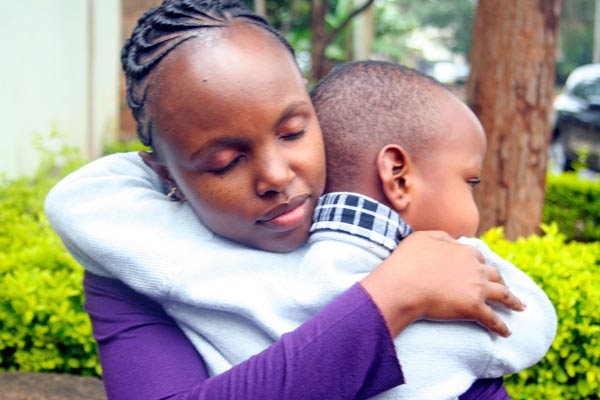
World Mom, Maryanne W. Waweru, and her son.
I began blogging when I was eight months pregnant with my first son, in March 2011. As a 32 year-old who had worked in both, the media and the development fields, for a decade, I considered myself ‘very well-knowledgeable about stuff’ and thought I knew all there was to know about pregnancy and motherhood.
But in those eight months, I had soon discovered that I really didn’t know much. This is because I would always have so many questions about the pregnancy – very simple, but yet, difficult questions that not even the internet could answer. At each gynecologist’s appointment, I would always have tens of questions for my doctor who thankfully was patient enough to answer them all.
But even then, there are questions that the doctor could not answer satisfactorily. I needed to hear from someone who’d gone through what I was going through, and hence, I would find myself asking many mums about their experiences and if what I was going through was normal – you know – the weird cravings, the forgetfulness, the clumsiness, the sleepiness and extreme laziness that I felt. Had they also gone through the same, or was there something wrong with me?
As the pregnancy neared the end, I asked them about their birth experiences, and if they, too, had felt anxious about labor, and how they had dealt with this fear. It always felt better having their support in my journey to motherhood.
Then my son came in April 2011. That was when it really dawned on me that it does indeed take a village to raise a child. Motherhood comes with no manual, and new motherhood can be completely confusing and overwhelming –especially if you don’t have a good support network.
My mum, mother-in-law, sisters, aunts, cousins and friends were on my speed dial as I asked them hundreds of questions a day. Then there was also my paediatrician, too, who thankfully, would also always offer the expert bit.
When I started my blog, Mummy Tales, at home in Kenya, it was about my own motherhood chronicles, but as my readership grew, my inbox would be filled with pregnant women and new mums asking me the same questions that I, myself, had asked when I was in their situation.
And the more my blog grew, the more women wrote in about their experiences with fertility struggles, miscarriages, still births, neonatal sepsis and more. Some I would answer, while others I would get the answers from doctors then share the responses with my readers.
With time, readers began sending me their experiences, asking me to post on my blog for the benefit of fellow women and mums.
This exchange of information enriched me too, and I realized that many women had undergone unfortunate pregnancy and childbirth experiences because they lacked adequate information. I remember one woman who had lost her pregnancy at 25 weeks due to high-blood pressure issues.
“It was only after I saw a story on your blog about a young woman who had died from eclampsia that I came to understand that I had actually been lucky to survive. In my next pregnancy, I paid more attention to everything I was going through, religiously attended all my antenatal clinics and paid attention to my pressure and urine levels during each visit, unlike before. I also became very keen on unusual swelling on my face, hands and feet. This time round, I asked the nurses many questions unlike in my first pregnancy. Even though I still developed pre-eclampsia again, I knew both my baby and I would survive because I was more informed. I was put on medication until the end of my pregnancy, and delivered a healthy baby. Thank God I had become more knowledgeable because of the article I read on your blog,” she told me.
Some of the most common questions I receive on my blog are about the warning signs in pregnancy, foods to eat and avoid during pregnancy, how to prepare for the birth experience and how to generally maintain a healthy pregnancy. I also get lots of questions about breastfeeding, weaning and baby’s nutrition. The answers I give come from my own personal experiences, the experiences of fellow readers, as well as the input of experts.
My blog today is an information hub with real-life practical experiences of motherhood. The ‘tales’ are relatable and as an online community, we are raising our children together, learning together, saving lives of both, mothers and children, and raising healthy babies together. My goal is to ensure that women and babies survive pregnancy and childbirth, and that mothers go on to enjoy the blessing of motherhood, by putting authentic information in their hands.
This is an original post to World Moms Blog by World Mom, Maryanne W. Waweru of Kenya of Mummy Tales.
Photo credit to the author and World Moms Blog.
Maryanne W. Waweru, a mother of two boys, writes for a living. She lives in Nairobi, Kenya with her family. Maryanne, a Christian who is passionate about telling stories, hopes blogging will be a good way for her to engage in her foremost passion as she spreads the message of hope and faith through her own experiences and those of other women, children, mums and dads. She can be found at Mummy Tales.
More Posts - Website

by Eva Fannon (USA) | Jan 14, 2016 | 2016, Awareness, Cancer, Girls, Health, Kids, Maternal Health, North America, Older Children, Sex, USA, Vaccines, World Voice, Younger Children
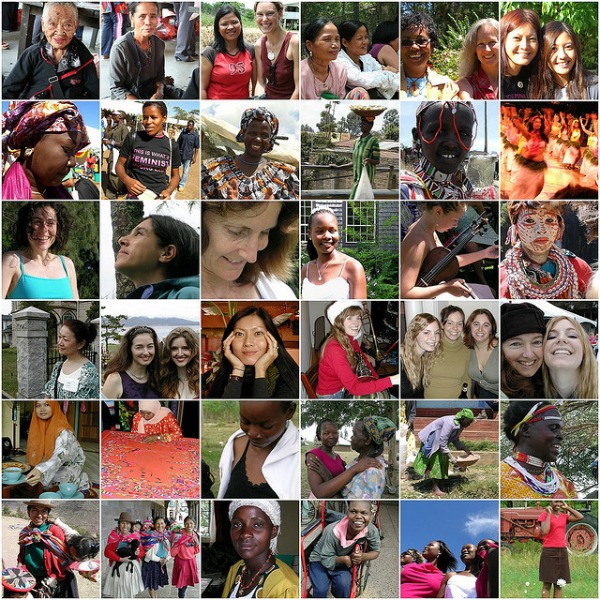
Many of us might hear the word “cancer” and automatically think that such a diagnosis would be a death sentence. This could be based on things we’ve heard, images we have seen portrayed in the media, or perhaps a personal experience – a friend or relative who has been affected by this “c” word. The truth is it greatly depends on the type of cancer…how early it is diagnosed…and whether or not a person has access to treatment.
In the US, January is #CervicalHealthMonth. Today we are talking it about it here because cervical cancer is an international issue and I’m sharing on World Moms Blog because it is an important topic to me, too. More than half a million women around the world are diagnosed with cervical cancer each year and over half of them die from the disease. The majority of these cases and deaths occur in low- and middle-income countries.(1) (more…)
Eva Fannon is a working mom who lives in the beautiful Pacific Northwest with her hubby and two girls. She was born and raised on the east coast and followed her husband out west when he got a job offer that he couldn't refuse. Eva has always been a planner, so it took her a while to accept that no matter how much you plan and prepare, being a mom means a new and different state of "normal".
Despite the craziness on most weekday mornings (getting a family of four out the door in time for work and school is no easy task!), she wouldn't trade being a mother for anything in the world. She and her husband are working on introducing the girls to the things they love - travel, the great outdoors, and enjoying time with family and friends. Eva can be found on Twitter @evafannon.
More Posts - Website
Follow Me:



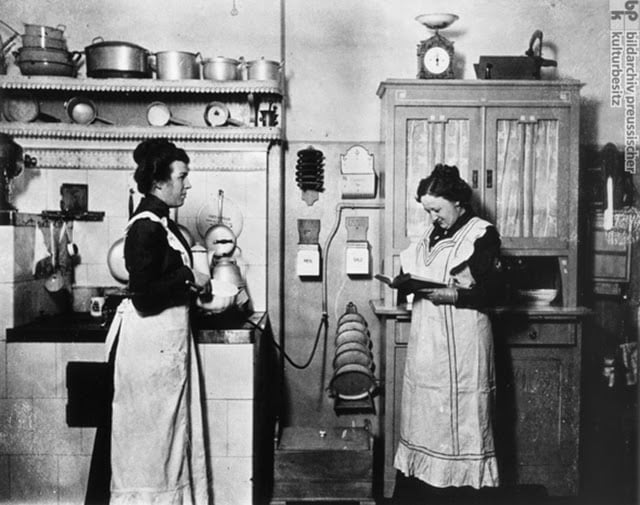
by Orana Velarde | Jan 13, 2016 | 2016, Asia, Indonesia, Responsibility, World Motherhood
I was born in Peru in 1978, when I was very little I spent a lot of time at my nonna’s (grandmother’s) house. I remember sitting with her in the bedroom while she talked with Antonina, the cook that had come upstairs to plan the day’s meals. My grandmother would ask if there were enough ingredients for something and Antonina would tell her what was missing. They would write a list, count out some money and then the cook would go off to the markets to get all she needed for lunch and dinner that day. In her apron she carried the handwritten recipe book; the page with the chosen recipe and some cash.
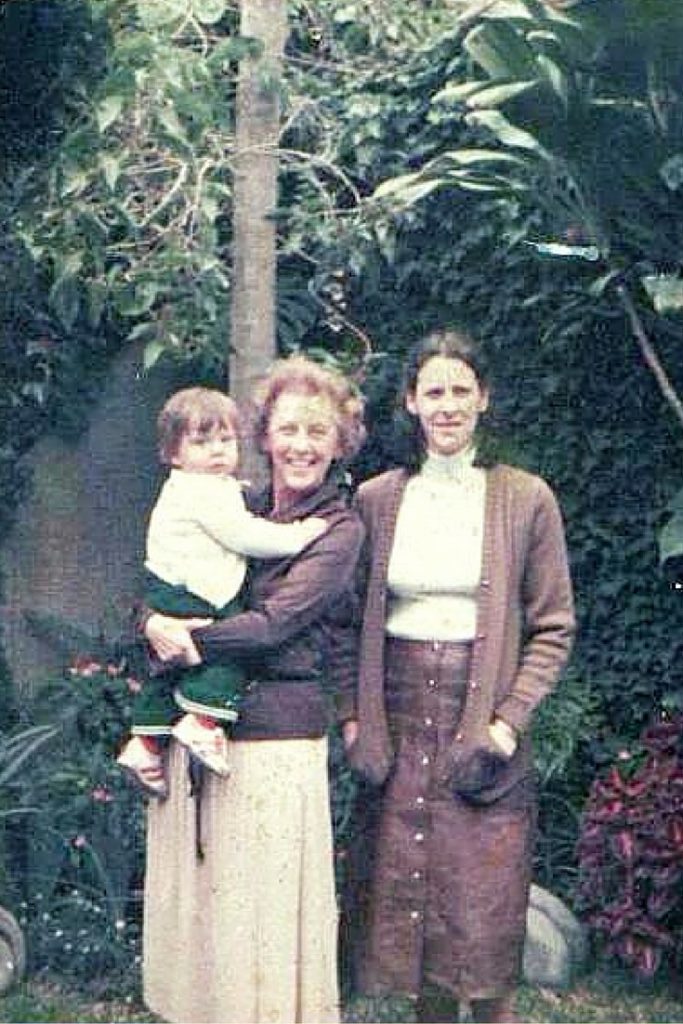
The author with her mom and grandmother.
After my nonna was dressed and ready to go and do some kind of activity, the upstairs maid was already making the beds and cleaning the bathrooms. Downstairs, the first floor maid was dusting or sweeping while the gardener took out weeds from the flowerbeds and the butler served breakfast. The chauffeur was in the kitchen drinking coffee with the seamstress. My nonno was already at the table with his newspaper and his coffee.
I remember all these things as if they were normal; a complete part of my nonna’s house. I didn’t think it strange that there were so many people doing so many different things around the house. This is the way my mom grew up, and that’s what I experienced until the age of 9.
The house I lived in with my mom was not like this, we “only” had a maid and a nanny. Little did I know that just these two people were a huge help!
I have moved away from Peru twice in my life, to the United States when I was 10 and then to Southeast Asia when I was 35. When I was 11, we didn’t have a maid, or a nanny or a cook or a gardener. Instead I had a very tired mom who would try and make me clean my room or throw away the trash or wash the dishes. Everything seemed so foreign and annoying. Then because of visa complications and jobs that were lost, my mother was the one cleaning houses for money. It’s funny how things can turn around like that.
When I went back to Peru to live with my aunt, she had two maids, a gardener, a washing lady, a front street guard and a handyman that painted or fixed things on a regular basis. When I went to live on my own in Cusco, the house I went to live in had a cook, a maid, a chauffer, a gardener and also a fix it all handyman. Back in Lima the first thing I did was hire a maid, and she stayed with me for 8 long and wonderful years.
Three and a half years ago we moved to Asia without our lovely maid and suddenly I had to do it all! Well wasn’t that a freaking shock! I remember walking into our house in Laos and stressing over the dust on the floor, and the ants, and the windows not being squeaky clean or beautifully see through! We did end up hiring a maid for the three months in Luang Prabang, mainly because I was extremely pregnant and the shock was way too big for me.
When we moved to Bangkok I started doing it all myself without help and my most vivid memory regarding this change was how I would stress out, over my 13 year old daughter not helping me out! Well how could I complain, she had grown up with a maid and nanny too, they did everything for her (and me). That was a harsh slap in the face, it was like reliving when I was a teenager and my own mom freaking out, over me not helping her out.

Domestic help in the kitchen
My mom learned the hard way, I learned the hard way and my daughter learned the hard way too. You will not always have the help you were accustomed to, you will not always be able to just sit back and wait for lunch to be served.
Those privileges are not always accessible, and for me now, they seem almost superfluous. I also feel that no one could ever be like Sabina, my maid of 8 years, she was like family to me, as I am sure my nonna’s cook was to her.
A few days ago I was at the indoor playground with my two kids, the cafeteria has some tables and sometimes they are not enough to seat all the parents and nannies that accompany the children so often, the tables are shared. While we were in the outdoor area playing on the swings, a Balinese woman sat at the table where we had our water bottles and snacks. I got to talking to her when we came back in to refresh in the Air Conditioning. She is a Stay at Home Mom that is finishing her masters in Law but only because she’s “bored”. She has a nanny who is also the cook and the maid in her house. The nanny was the one playing with her son in the playground while she shopped for clothes on her laptop.
She was amazed at how I would actually play with my kids, she said she really disliked playing with her son, that she got bored very fast. She asked how much videos I let them watch and told me how her family would judge her if her son watched “too much” YouTube. This conversation put a lot of things into perspective for me. It really isn’t about where you live that decides if you will have domestic help or not, it’s the way you are brought up and what your priorities are.
I remember in Peru knowing of families that did not have that much income but nevertheless had a maid or nanny and other families with nice houses and higher paying jobs that decided that they did not want a nanny at all and at most had a cleaning lady come to their house once a week. The Balinese woman in the playground told me that that’s the way it’s done here, you have a maid and a nanny and a cook even if you are a Stay at Home Mom. Exactly like my nonna.
My husband offers to pay for nannies and cooks and maids all the time when I complain of being tired of the work but I keep on saying “no”.
I have finally given in to a cleaning lady who comes three times a week to do the mopping and bathroom scrubbing. I also managed to get a gardener so now my front garden and backyard are looking beautiful. I have made “friends” with a couple taxi drivers so essentially I have a chauffeur. What I still don’t have is a nanny, and that might take a long time for me to feel comfortable with.
The need for Domestic Help I have come to realize is totally a psychological thing, you get it if you feel you need or want it.
If you can’t afford it then you pass the days wishing you could have it. If you have it, then you pass the days thinking of how you are wronging your kids by not being with them as much as other moms. It’s a lesson to learn and find balance in how you manage your house and kids. I feel that I am still learning.
What is the “domestic-help” scenario at your own place? And what is your take on it?
This is an original post to World Moms Blog by World Mom, Orana Velarde in Bali, Indonesia.
Photo credits to the author.

by World Moms Blog | Jan 12, 2016 | 2016, Life Lesson, Middle East, Multicultural, Prejudice, Race, Refugees, Religion, Respect, World Moms Blog, World Voice
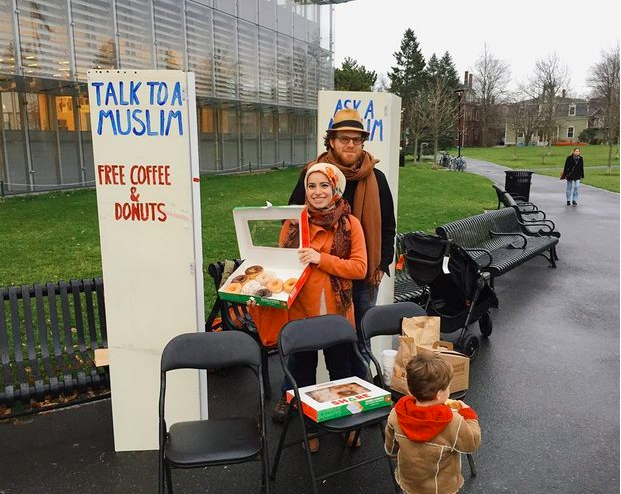
Photo: Courtesy of Mona Haydar
In the age of cellphones and social media, it’s very easy to disconnect from people without realizing you’re doing so. How many of us create walls subconsciously, especially if it concerns people of different nationalities we don’t usually associate with?
I was struck by a story of a woman who decided to set up a stand outside of a library in Cambridge, MA. Inspired by a story her husband saw on NPR titled “Ask an Iraqi”, Mona Haydar thought that it was important for her to establish a connection with those who may not know what’s it’s like to be a Muslim, especially a Muslim woman living in the United States.
For Haydar, setting up a stand titled “Talk To A Muslim” was a way for her to dispel any preconceived notions or stereotypes so many have of foreigners, especially of Muslim women.
With so many crises affecting different nationalities, in light of events happening in Syria, Haydar’s goal of creating a physical stand and waiting for people to approach her was a bold move since she had no clue how it would be received. What was surprising and hopeful was that people did stop by and spoke with Haydar, and that was a start. She was quite surprised to see how people did respond to her stand and while the reception was initially uncertain, it was enough for her to think about setting up the stand again.
In the current climate regarding people of cultures we aren’t familiar with, not willing to find out about them says more about us than them. There shouldn’t be a division of “them” and “us”, but unfortunately, there is.
How many times have we been guilty of giving in to fear of the unknown instead of taking a step back and dispelling the stereotypes we have learned about other cultures?
As someone who has had to answer questions about my nationality or religion over the years, the initial offense I felt has made me rethink of how people perceive me. Over the years, I have been mistakenly identified as either Korean or Japanese, rarely a Filipina. In addition, since I’m married to a Jewish man, I have been asked whether I’m a convert or adopted due to my Jewish maiden name, and to which I answer “no” to both. Answering these questions over the years, my frustration over being categorized primarily due to my physical appearance has made me realize that it’s not because of ignorance, but lack of communication. Asking questions and conversing about each other’s cultures would go a long way than being presumptuous about other people’s lives.
After reading about Haydar and seeing the NPR segment titled “Ask An Iraqi”, it made me wonder if we should put ourselves in Haydar’s shoes. Should we have to set up a stand in order to be understood or be compassionate towards others? Have we become so desensitized by our own prejudices that we have no room for being tolerant? I would hope not. Haydar’s stand may just be one form of starting conversations regarding one’s culture, but I think it’s an idea worth exploring. We might just realize that we may not look alike, but we all share the same intrinsic values of goodness towards humanity.
Read the original article regarding this post Here.
How do you think we can nurture better cross-cultural understanding?
This is an original post written by World Moms Blog Contributor Tes Silverman of The Pinay Perspective
World Moms Blog is an award winning website which writes from over 30 countries on the topics of motherhood, culture, human rights and social good. Over 70 international contributors share their stories from around the globe, bonded by the common thread of motherhood and wanting a better world for their children.
World Moms Blog was listed by Forbes Woman as one of the "Best 100 Websites for Women 2012 & 2013" and also called a "must read" by the NY Times Motherlode in 2013. Our Senior Editor in India, Purnima Ramakrishnan, was awarded the BlogHer International Activist Award in 2013.
More Posts

 I used to visit the library every chance I had. It was my favorite place in the world. I loved its quiet atmosphere, the air thick and warm with stories, knowledge, wisdom, all ready to be discovered in hundreds of books.
I used to visit the library every chance I had. It was my favorite place in the world. I loved its quiet atmosphere, the air thick and warm with stories, knowledge, wisdom, all ready to be discovered in hundreds of books.


















